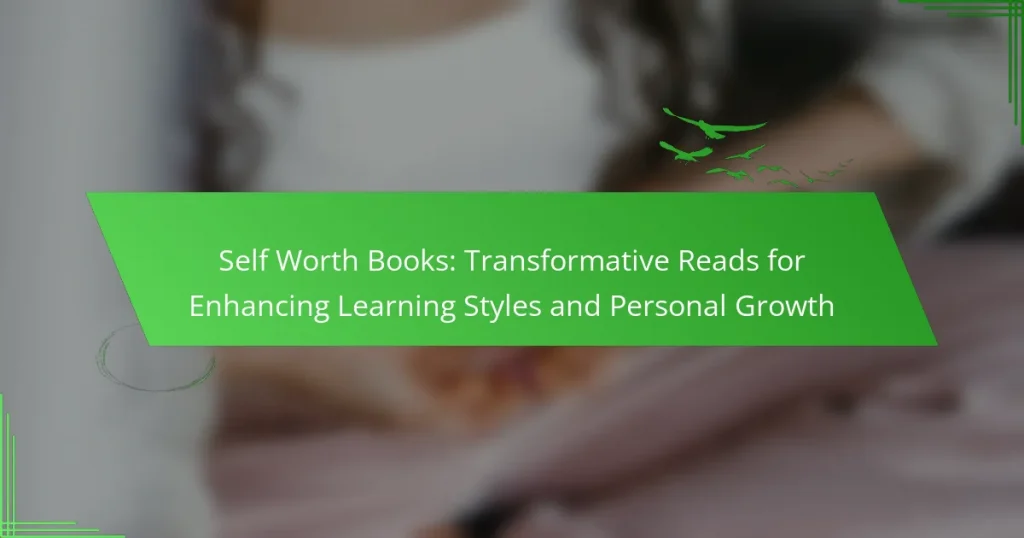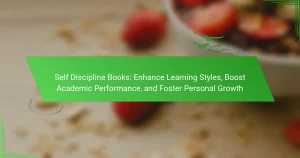Self Worth Books are vital tools for personal growth and enhancing learning styles. They promote self-awareness, boost confidence, and provide actionable strategies for resilience. These transformative reads incorporate practical exercises and diverse perspectives to resonate with various readers. Engaging with self-worth literature can lead to improved emotional intelligence and healthier relationships.
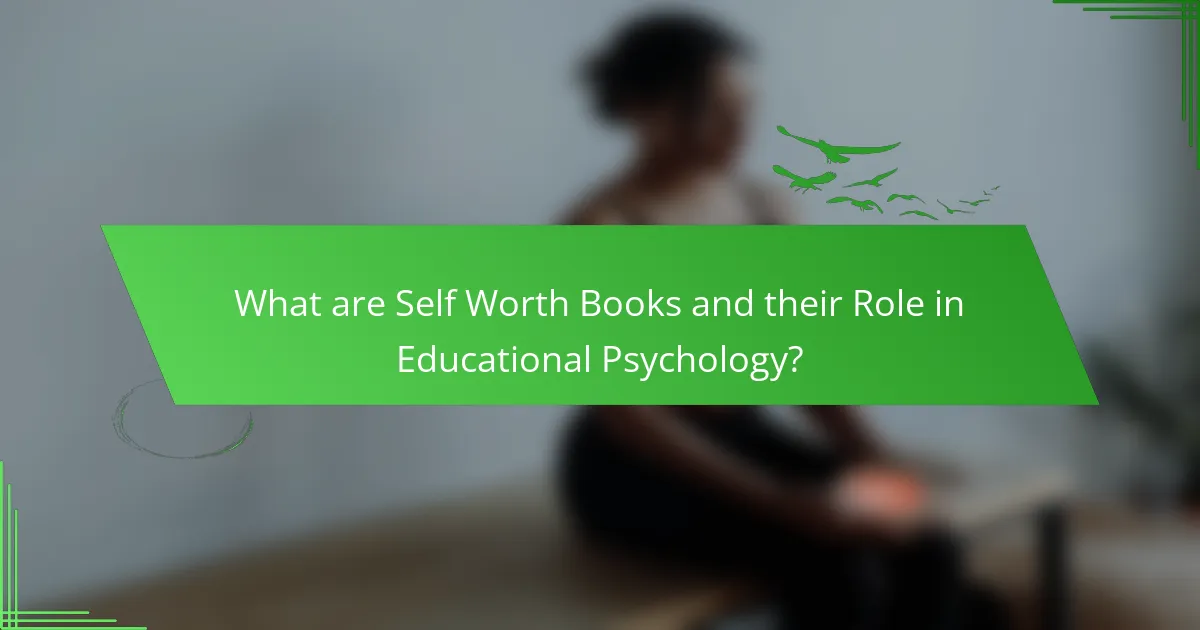
What are Self Worth Books and their Role in Educational Psychology?
Self Worth Books are essential resources in educational psychology, promoting personal growth and enhancing learning styles. These books help individuals understand their value, improve self-esteem, and foster resilience. Research indicates that reading self-worth literature can lead to significant improvements in academic performance and emotional well-being. For example, studies show that students who engage with these texts exhibit higher motivation levels and better coping strategies. The unique attribute of self-worth books is their ability to provide actionable insights, making them transformative tools in the educational landscape.
How do Self Worth Books Influence Learning Styles?
Self Worth Books significantly influence learning styles by promoting self-awareness and personal growth. These transformative reads encourage readers to explore diverse perspectives and adapt their learning approaches.
Enhanced self-esteem from these books empowers individuals to embrace different learning styles, leading to improved retention and application of knowledge. For instance, readers may shift from a passive to an active learning style, engaging more deeply with material.
Moreover, self worth literature often includes practical exercises that cater to various learning preferences, such as visual, auditory, and kinesthetic. This adaptability fosters a more personalized learning experience, making education more effective and enjoyable.
In summary, Self Worth Books serve as catalysts for enhancing learning styles by nurturing confidence and offering strategies that resonate with individual preferences.
What Psychological Theories Support the Use of Self Worth Books?
Self worth books are supported by psychological theories such as Maslow’s Hierarchy of Needs, which emphasizes self-actualization and personal growth. These theories suggest that enhancing self-worth can lead to improved motivation and learning. Cognitive Behavioral Theory also supports the use of these books by addressing negative thought patterns and fostering a positive self-image. Furthermore, the concept of self-efficacy, introduced by Bandura, highlights how belief in one’s abilities influences personal development and achievement. These theories collectively validate the transformative potential of self worth books in promoting personal growth and effective learning styles.
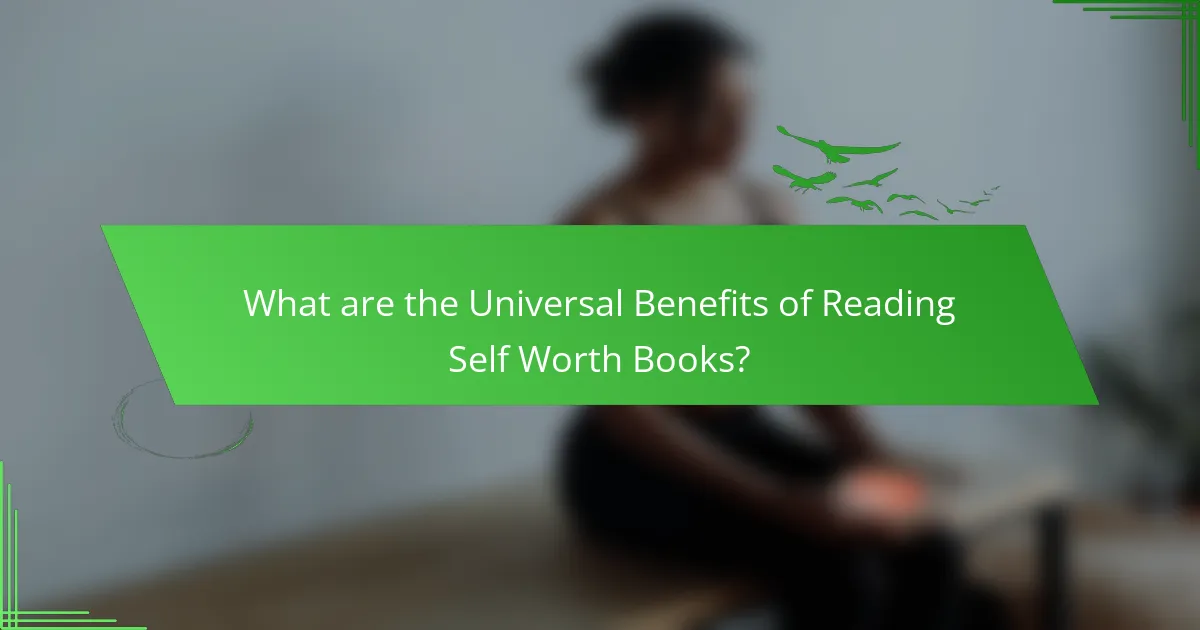
What are the Universal Benefits of Reading Self Worth Books?
Reading self-worth books enhances personal growth by fostering self-awareness, boosting confidence, and encouraging resilience. These transformative reads provide practical strategies and insights, allowing individuals to embrace their unique attributes and overcome challenges. Engaging with such literature can lead to improved emotional intelligence and healthier relationships. Moreover, studies show that self-help books significantly impact mental well-being, making them invaluable resources for anyone seeking to enhance their self-worth.
How Can Self Worth Books Enhance Self-Efficacy in Learners?
Self-worth books can significantly enhance self-efficacy in learners by fostering confidence and resilience. These transformative reads encourage positive self-reflection, which empowers individuals to set and achieve personal goals. Research indicates that individuals who engage with self-worth literature often report improved motivation and a greater sense of agency in their learning processes. By cultivating a growth mindset, these books help learners view challenges as opportunities rather than obstacles. The unique attribute of self-worth books lies in their ability to connect emotional well-being with academic success, creating a holistic approach to personal development.
What Impact Do Self Worth Books Have on Emotional Intelligence?
Self worth books significantly enhance emotional intelligence by fostering self-awareness and empathy. These transformative reads guide individuals in recognizing their value, which in turn improves interpersonal skills and emotional regulation. As readers engage with these texts, they often report increased resilience and a deeper understanding of their emotions and those of others. This growth leads to healthier relationships and improved communication, crucial components of emotional intelligence.
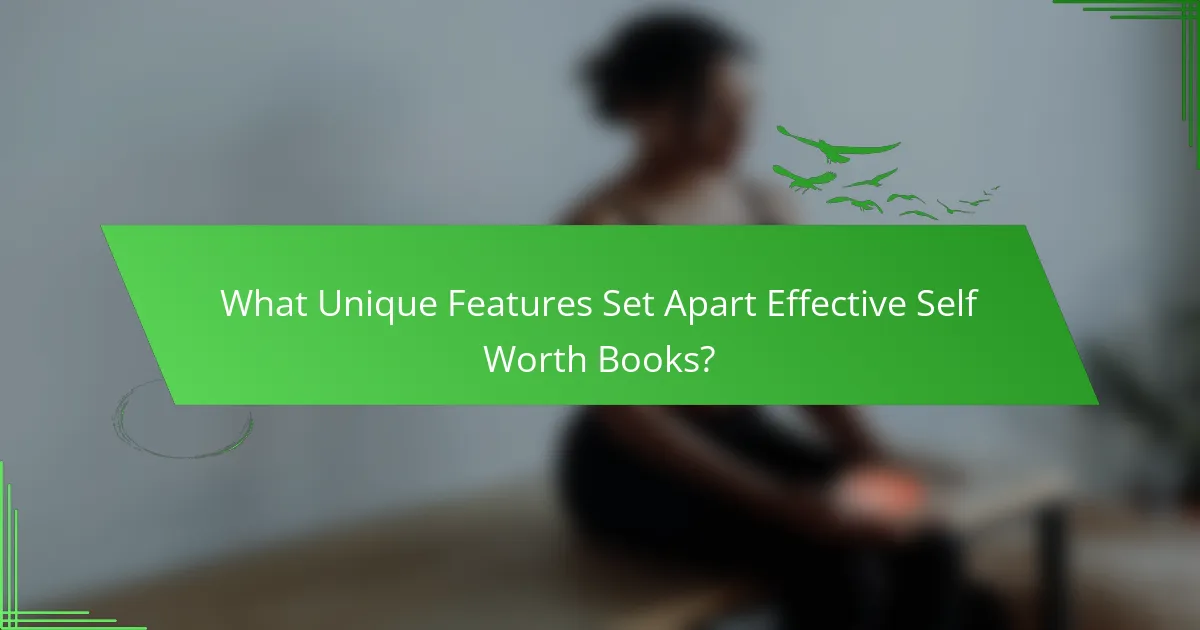
What Unique Features Set Apart Effective Self Worth Books?
Effective self-worth books stand out through their unique approaches to personal development and learning styles. They often incorporate practical exercises, relatable anecdotes, and evidence-based strategies that resonate with diverse readers. These books emphasize self-reflection and actionable insights, fostering a deeper understanding of one’s intrinsic value. Unique attributes include tailored content for different learning preferences and a focus on emotional intelligence, enhancing the reader’s journey toward self-acceptance and growth.
Which Authors are Renowned for Their Contributions to Self Worth Literature?
Authors renowned for their contributions to self-worth literature include Brené Brown, Nathaniel Branden, and Louise Hay. Their works focus on self-acceptance, personal empowerment, and emotional resilience, making significant impacts on readers’ lives. Brené Brown emphasizes vulnerability as a strength, while Nathaniel Branden explores the psychology of self-esteem. Louise Hay’s affirmations promote healing and self-love, offering transformative insights for personal growth. Each author provides unique perspectives, enriching the self-worth genre.
What Distinctive Approaches Do Popular Self Worth Books Utilize?
Popular self-worth books utilize distinctive approaches like personal narratives, practical exercises, and research-backed strategies. These methods engage readers, fostering emotional connections and actionable insights. For example, books may incorporate storytelling to illustrate concepts, making them relatable and memorable. Additionally, many emphasize self-reflection techniques, urging readers to evaluate their beliefs and behaviors. This unique attribute of combining personal growth with interactive elements enhances learning styles, promoting deeper understanding and lasting change.
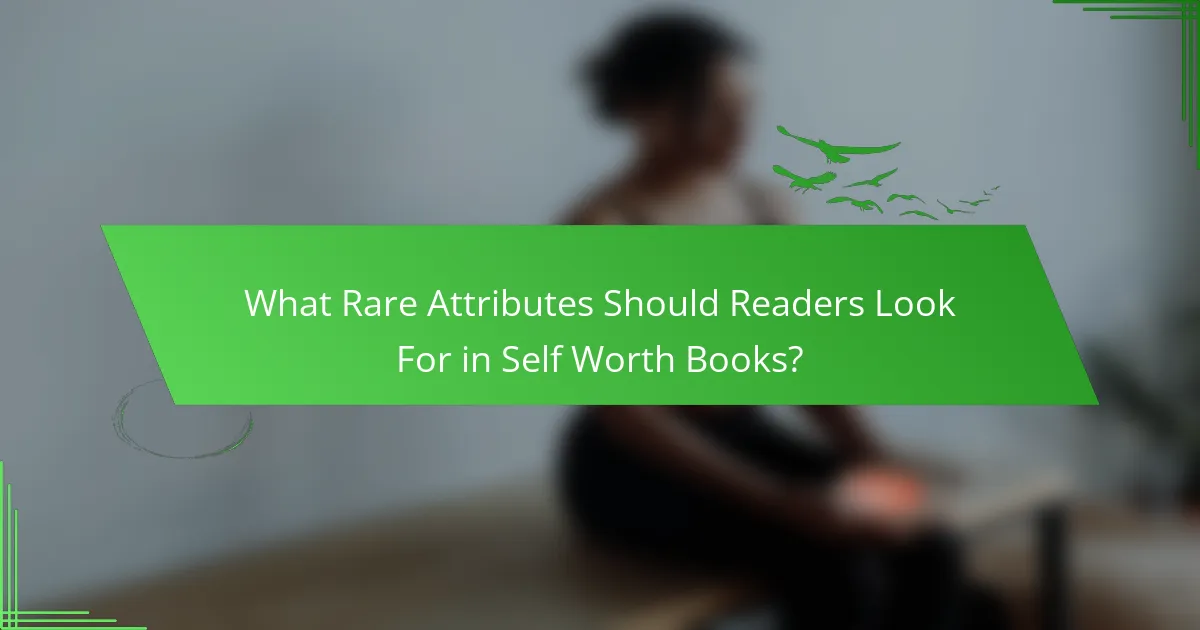
What Rare Attributes Should Readers Look For in Self Worth Books?
Readers should look for rare attributes in self-worth books that offer unique insights and transformative experiences. These attributes include personal anecdotes from authors, innovative frameworks for self-reflection, and evidence-based strategies for building self-esteem. Such elements make a book stand out and enhance its effectiveness for personal growth. Additionally, books that incorporate diverse perspectives and interdisciplinary approaches can provide richer content and foster deeper understanding.
How Do Cultural Perspectives Influence the Reception of Self Worth Books?
Cultural perspectives significantly shape how self-worth books are received, influencing interpretation and impact. Different cultures prioritize various values, which affects readers’ connections with the material. For instance, collectivist societies may focus on community and relationships, while individualistic cultures emphasize personal achievement. These contrasting views can lead to diverse interpretations of the same content, altering the perceived effectiveness of the books. Additionally, cultural norms around self-expression and vulnerability can impact how openly readers engage with themes of self-worth, thereby affecting personal growth outcomes. Understanding these dynamics is crucial for authors and marketers aiming to reach a global audience.
What Innovative Formats Are Emerging in Self Worth Literature?
Self Worth literature is increasingly adopting innovative formats that enhance engagement and personal growth. Interactive workbooks, podcasts, and digital platforms are emerging as popular mediums, allowing readers to actively participate in their learning journey. These formats cater to diverse learning styles, offering practical exercises alongside traditional narratives. For instance, self-guided journals encourage reflection, while video content provides visual storytelling that resonates with a broader audience. The trend towards multimedia integration signifies a shift in how self-worth concepts are communicated, making them more accessible and impactful.
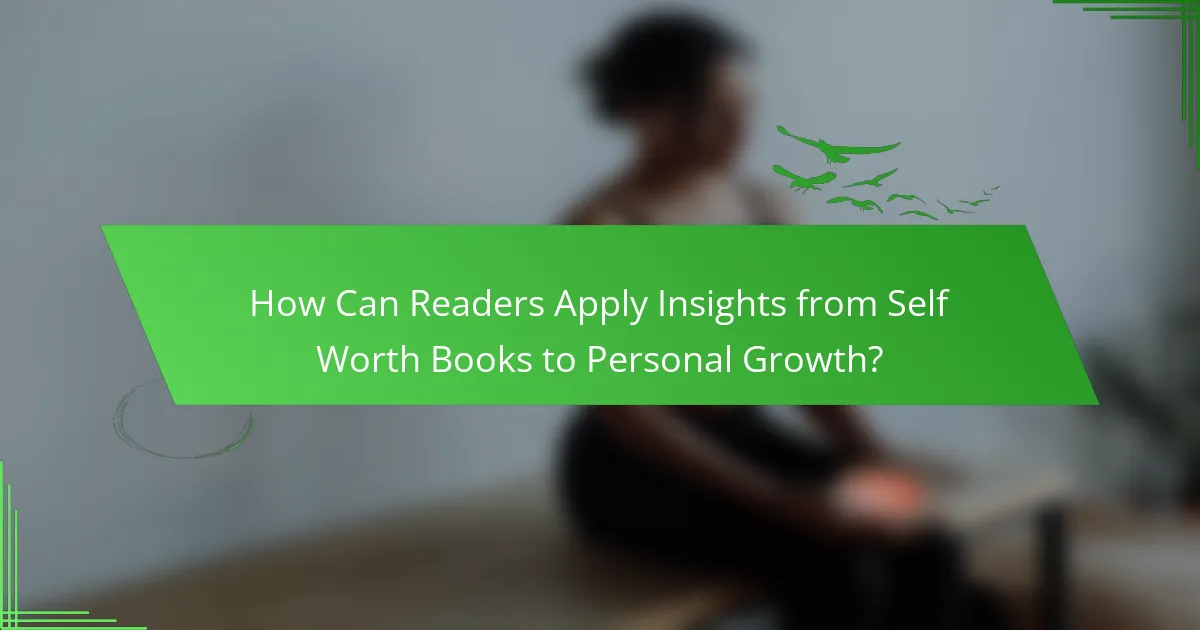
How Can Readers Apply Insights from Self Worth Books to Personal Growth?
Readers can apply insights from self-worth books to enhance personal growth by implementing actionable strategies and fostering a positive mindset. These books often emphasize self-acceptance, resilience, and the importance of setting boundaries. By practicing the techniques outlined, such as journaling or affirmations, individuals can cultivate a stronger sense of self-worth. Engaging with these texts encourages reflection, helping readers identify personal values and goals. Ultimately, consistent application of these insights can lead to transformative changes in behavior and mindset.
What Practical Strategies Can Enhance Learning Through Self Worth Books?
Reading self-worth books can significantly enhance learning by fostering confidence and resilience. These books often provide practical strategies such as goal setting, self-reflection exercises, and mindset shifts that encourage personal growth. For example, integrating affirmations can boost self-esteem, leading to more effective learning experiences. Additionally, applying concepts from these books can help individuals identify their unique learning styles, allowing for tailored approaches that maximize retention and understanding. Engaging with self-worth literature cultivates a positive self-image, which is crucial for overcoming challenges and embracing lifelong learning.
How to Create a Reading Plan for Maximum Impact?
To create a reading plan for maximum impact, focus on selecting self-worth books that resonate with your learning style. Start by identifying your primary learning preferences, such as visual, auditory, or kinesthetic. This ensures you choose transformative reads that enhance personal growth effectively.
Next, set a specific duration for your reading plan, such as one book per month, to maintain consistency and engagement. Incorporate reflection periods after each book to assess how the insights apply to your life.
Lastly, consider unique attributes of the books, such as author credibility and reader reviews, to ensure they align with your personal development goals. This structured approach maximizes the impact of your reading journey.
What Common Mistakes Should Be Avoided When Choosing Self Worth Books?
When choosing self-worth books, avoid common mistakes that can hinder personal growth. Prioritize books that align with your learning style and avoid those that lack credible authorship or evidence-based content. Seek diverse perspectives to enrich your understanding and ensure the material resonates with your unique experiences. Lastly, do not overlook the importance of actionable insights that promote practical application in daily life.
How Can Feedback from Self Worth Books Be Integrated into Learning Styles?
Feedback from self-worth books can enhance learning styles by promoting self-awareness and fostering a growth mindset. These books often provide strategies that cater to various learning preferences, such as visual, auditory, and kinesthetic methods. For instance, a reader who learns best through visuals may benefit from illustrated concepts found in these books. Additionally, integrating affirmations and reflective exercises can align with experiential learning styles, allowing individuals to internalize lessons effectively. By applying insights from self-worth literature, learners can tailor their approaches, leading to improved engagement and personal growth.
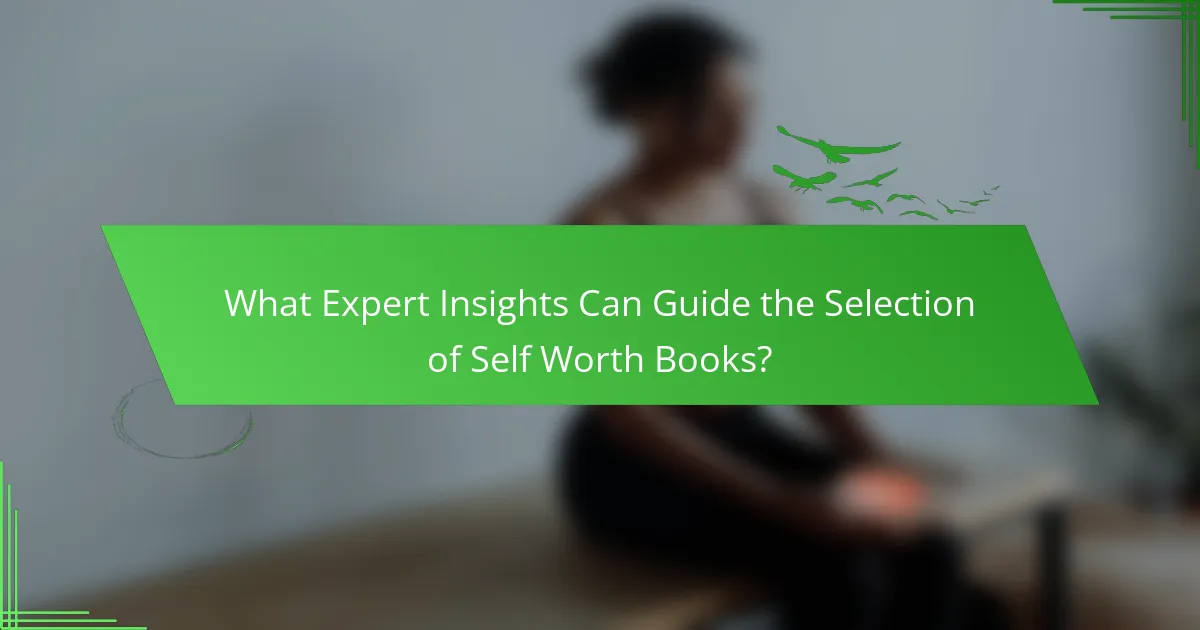
What Expert Insights Can Guide the Selection of Self Worth Books?
Expert insights suggest focusing on personal resonance, diversity of perspectives, and practical applications when selecting self-worth books. Look for titles that align with your learning style and encourage personal growth. Books that integrate actionable exercises can enhance retention and application of concepts. Additionally, consider authors with credible backgrounds in psychology or personal development, as their insights often provide deeper understanding. Engaging with a variety of genres can also broaden your perspective and foster a more holistic approach to self-worth.
